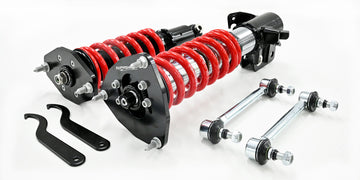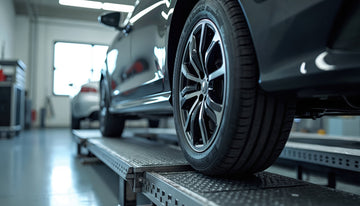If you are unsatisfied with aspects of your car, such as handling and performance, ride height and stiffness, control and stability while cornering and its appearance, you might benefit from switching your car to coilover suspension.
However, to know for sure whether coilover suspension is the right option for you, you need to be aware of the pros and cons of coilover suspension. We will cover that topic in this article.
What is coilover suspension?
Coilover suspension is a type of suspension system used in vehicles, particularly high-performance and sports cars, that combines a shock absorber and a coil spring into a single unit. Depending on the vehicle, sometimes a separate spring and shock absorber may be used, but offers higher performance over the standard suspension.
In a coilover suspension system, the spring is seated over the shock absorber, which is mounted to the vehicle's chassis. The height and stiffness of the spring can be adjusted to modify the vehicle's ride height and handling characteristics, making coilover suspension a popular choice for those looking to improve their vehicle's performance and aesthetics.
Coilover suspension is generally considered to be more customisable and higher-performing than standard or OEM suspension systems, however may sacrifice some comfort, depending on spring rates and damping tune.
What are the pros of coilover suspension?
Improved handling and performance
Coilover suspension improves handling and performance in several ways. For example, coilover suspension can help distribute weight more evenly across the vehicle, improving overall balance and stability. This is particularly important during high-speed cornering, where weight distribution can greatly affect the vehicle's handling.
It is also designed to reduce body roll, which is the side-to-side motion of the vehicle during cornering. By minimising body roll, the suspension can keep the vehicle more stable and better in control.
Additionally, coilovers provide more precise control over the vehicle's movements than traditional suspension systems. This is because the spring and shock absorber are designed to work together, providing more consistent and predictable suspension behaviour.
Coilover suspension can also improve the vehicle's grip on the road, particularly during cornering. This is because the suspension is better able to maintain contact with the road surface, ensuring that the tires stay in contact with the ground.
Customisable ride height and stiffness
Coilover suspension improves ride height and stiffness by allowing for easy adjustment of the height and stiffness of the vehicle's suspension system. The compression or extension of the spring wrapped around the shock absorber determines the ride height, while its stiffness determines the suspension's firmness.
To adjust the ride height, the coilover system allows you to change the height of the threaded sleeve that sits on the shock absorber. By rotating the sleeve up or down, you can adjust the position of the spring and thereby raise or lower the ride height of the vehicle.
To adjust the stiffness of the suspension, you can adjust the preload on the spring. This involves compressing or expanding the spring before installation to set the initial load. By increasing or decreasing the preload, you can make the suspension softer or stiffer.
These adjustments allow you to customise your vehicle's suspension to your specific performance needs.
However, it is important to note that these adjustments can affect the vehicle's handling and should be done carefully and with proper knowledge of how they will impact the vehicle's performance.
Better control and stability during cornering
Coilover suspension improves control and stability during cornering by providing better weight transfer and reducing body roll.
During cornering, a vehicle's weight shifts towards the outside of the turn, which can cause the inside wheels to lift off the ground, reducing traction and stability. Coilover suspension helps to counteract this by providing a stiffer and more responsive suspension, which helps to keep the wheels in contact with the road surface. This improves traction and stability, allowing the driver to maintain better control of the vehicle through corners.
In addition, coilover suspension also helps to reduce body roll, which is the tendency of a vehicle's body to lean to one side during cornering. This is because the stiffer springs and dampers in a coilover suspension system are better able to resist the forces that cause body roll, resulting in a flatter and more stable ride through corners.
Vehicle appearance
Coilover suspension can enhance the appearance of a vehicle by providing greater control over ride height, which can make the car look more aggressive and sporty, and by allowing for improved wheel fitment for the installation of wider wheels and tires, which can make the car look more custom and performance-oriented.
What are the cons of coilover suspension?
Higher cost compared to traditional suspension systems
The higher cost of coilover suspension systems is typically justified by their improved handling and performance, customisation options, and increased durability and longevity. However, it's important to weigh the costs and benefits of coilover suspension against your specific needs and budget.
For example, coilover suspension systems typically use higher quality materials and components, such as stiffer springs, adjustable dampers, and stronger mounts. These components are designed to withstand the additional stress and forces generated by high-performance driving and racing, which can increase their cost.
Additionally, coilover suspension systems are designed to be customised to meet your specific needs. This requires more engineering, testing, and development time, which can increase the cost of the system.
The design and construction of a coilover suspension system is more complex than a traditional suspension system, requiring more advanced manufacturing processes and machinery. This also lends to the higher cost.
Less comfortable ride on rough roads
Coilover suspension systems are designed with performance in mind, which often means sacrificing some degree of comfort for improved handling and control.
The components of coilover suspension are often stiffer than those found in traditional suspension systems, which can result in a harsher ride, particularly on rough roads where the suspension has to work harder to absorb bumps and vibrations.
Additionally, coilover suspension is often adjustable, which means that it can be tuned for different driving conditions and preferences. While this can be an advantage for those looking to customise their suspension for specific driving scenarios, it can also lead to a less comfortable ride on rough roads if the suspension is not properly tuned for the conditions.
Need for more careful maintenance
The other downsides of using coilover suspension as being a performance upgrade, will require more careful maintenance and adjustments as needed than traditional suspension systems for a few reasons.
For example, one of the advantages of coilover suspension is its performance. However, this also means that more maintenance is required to maintain the desired performance. For example, if you lower your ride height, you may need to adjust the suspension to maintain proper alignment and avoid premature wear of the tires and other suspension components.
Additionally, coilover suspension is often used in high-performance applications where the suspension is subjected to greater stress and wear, as well as potential exposure to environmental factors, such as temperature and humidity, can cause the oil in the shock absorber to thicken or thin out. This can result in the need for more frequent maintenance and adjustments to maintain optimal performance.
The quality of the coilover suspension components can also affect the frequency of maintenance and adjustments required. Lower-quality components may wear out more quickly, requiring more frequent replacements and adjustments.
Potential for reduced suspension travel and ground clearance
In a traditional suspension system, the shock absorber is separate from the spring; whereas, in a coilover suspension system, the shock absorber and spring are combined into one unit, which reduces the amount of space available for suspension travel.
Additionally, lowering the ride height with coilover suspension can further reduce suspension travel and ground clearance.
However, not all coilover suspension systems will reduce suspension travel and ground clearance. Some coilover systems are designed to maintain or even improve suspension travel, depending on the specific application and goals of the driver.
It's important to choose a coilover suspension system that is appropriate for your needs and driving conditions to avoid any potential negative effects on suspension travel and ground clearance.
How do I choose the right coilover suspension?
Choosing the right coilover suspension can be a challenging task, as there are many factors to consider. Here are some key factors to consider when choosing a coilover suspension:
Vehicle type
The type of vehicle you have will play a significant role in determining the type of coilover suspension you should choose. Different types of vehicles have different suspension needs and requirements.
Driving style
Your driving style will also influence the type of coilover suspension you should choose. If you drive your vehicle aggressively, you may need a stiffer suspension to handle the increased stress and strain.
Adjustability
Coilover suspensions can be adjusted for stiffness, ride height, and other factors. Consider the level of adjustability you need and whether you want a coilover suspension that is easy to adjust.
Quality
The quality of the coilover suspension components is critical. High-quality components will provide better durability and performance than lower-quality components.
Budget
Coilover suspensions can vary in price from a few hundred dollars to several thousand dollars. Determine your budget before you start shopping to avoid overspending.
Brand reputation
Look for a reputable brand with a proven track record of performance and reliability.
Compatibility
Ensure that the coilover suspension you choose is compatible with your vehicle's make and model.
Where can I go for high quality coilover suspension for my vehicle?
Contact Supashock by phone or by email to get the best quality coilover suspension for your vehicle.





